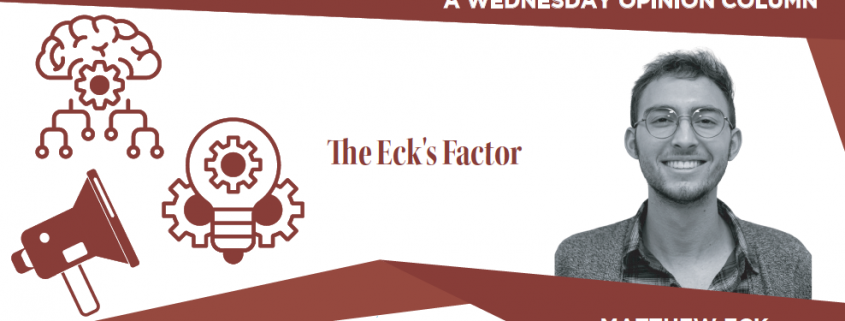The Eck’s Factor: Sexual minority stigma continues to marginalize the LGBTQ+ community
After writing for the Daily Trojan for the past two years, my first editorial remains perhaps my most controversial piece.
Written in light of Undergraduate Student Government’s announcement of free HIV testing for USC students, the editorial argued that while free HIV testing was a progressive step in the right direction, comprehensive STI testing should be the ultimate goal. On a campus that encourages safe sex practices, it seemed almost contradictory that students still paid out of pocket for routine STI screenings that most health insurance companies do not cover.
It incited debate on Facebook. I was scrolling through my own feed to stumble upon USC alumni arguing with USC students over the validity of my argument: Does a university really owe its students free STI testing? Of course, these counter arguments were in the same vein as anti-universal health care positions. Where will this money come from? I shouldn’t have to pay for other people to receive health care! I even received an email from a university health center clinician, imploring me to “dig deeper” and “ask more than state an opinion.”
First and foremost, I stand by my original argument — STI testing remains inaccessible especially to sexual minorities, or people who identify as LGBTQ+. The stigma that accompanies STIs prevents people from receiving the proper treatment, which correlates with several socio-economic trends that demonstrate how LGBTQ+ individuals are more likely to lack access to healthcare — especially LGBTQ+ people of color.
Similarly, sexual minorities encounter a stigma both outside and within their communities. HIV-positive people still experience discrimination, which is exacerbated by misinformation and miseducation. Transgender athletes’ existence remains controversial and plagued by trans-exclusionary radical feminists, also known as TERFs, who want equality for women in sports — but only cisgender women. Ultimately, we must be able to talk about sexual minority stigma in order to address the inequities prompted by it.
According to a study conducted by the Department of Psychology at the University of California, Davis, sexual minority stigma subjects LGBTQ+ members to “explicit or subtle discrimination, to be marginalized or made virtually invisible by many of society’s institutions, and often vilified.” Society perpetuates this prejudice through the belief that homosexuality is invalid compared to heterosexuality, otherwise known as “heterosexism.” This ideology can be internalized by sexual minorities, who can easily succumb to the negative beliefs held by the majority. We see this same sociological phenomenon with internalized misogyny, internalized racism and any other prejudice that marginalizes a distinct community.
In fact, another study conducted by the Southern Gerontological Society concluded that sexual minority stigma in healthcare settings — enacted by healthcare providers and internalized by patients — is correlated to higher sexual risk behaviors in HIV-positive gay and bisexual men. The study also found that sexual minority stigma correlated to infrequent healthcare utilization and amplified stress levels in gay and bisexual men, which indicates a lack of willingness to seek routine sexual health testing.
Ultimately, this study justifies how sexual minority and HIV stigma endangers the health of sexual minorities because partaking in more sexual risk behaviors, not seeking appropriate healthcare services and not receiving appropriate healthcare services heighten their risk of contracting STIs.
People still insist that sexual minority stigma disappeared when gay marriage was legalized in the United States. Yet we have a newly appointed supreme court justice who framed sexuality as a “preference” in her confirmation hearings, and the official GOP platform still condemns same-sex marriage.
Furthermore, we consistently subvert transgender people in these conversations. In an op-ed published by The Wall Street Journal, writer Abigail Shrier asserts that President Joe Biden’s executive order to prevent discrimination on the basis of gender identity or sexual orientation “rigs competition by requiring biological boys be allowed to compete against girls.”
I have several problems with this article, but my main takeaway is that not allowing transgender students to compete with their gender is transphobic. Cisgender women are not being cheated. Transgender athletes do not endure sexual minority stigma and subject themselves to systemic violence to simply win a medal.
This same transphobic argument about trans women having an unfair hormone advantage is arbitrary; some people, including cis women, naturally have more testosterone levels. According to Dr. Joshua Safer, Executive Director of the Mount Sinai Center for Transgender Medicine and Surgery, “A person’s sex is made up of multiple biological characteristics and they may not all align as typically male or female in a given person…Further, many people who are not trans can have hormones levels outside of the range considered typical of a cis person of their assigned sex.” I ask writers to take one gender studies course before they publish transphobic material that disregards the sex and gender spectrum.
To diminish this stigma, it is imperative to open the conversation about enacted and internalized sexual minority stigma when discussing any LGBTQ+ related issues. For example, while discussing STI statuses, some people refer to themselves as “clean” when they’re STI negative. When I try to discuss the problem with this, I have been called the “politically correct police.” To be clear, correlating an HIV-negative status to “clean” insinuates that being HIV-positive is “dirty,” thus ostracizing people with an HIV-positive status.
Ultimately, the sexual minority stigma will continue to spread misinformation and wreak havoc if we do not confront it. As an openly bisexual man, these issues strike a chord with me, and I will strive to educate others and instigate civil discourse in the hopes of expanding health care access and advocating for marginalized groups. In the end, I am simply asking for justice.
Matthew Eck is a junior writing about hot-button social issues. His column, “The Eck’s Factor,” runs every other Wednesday.

